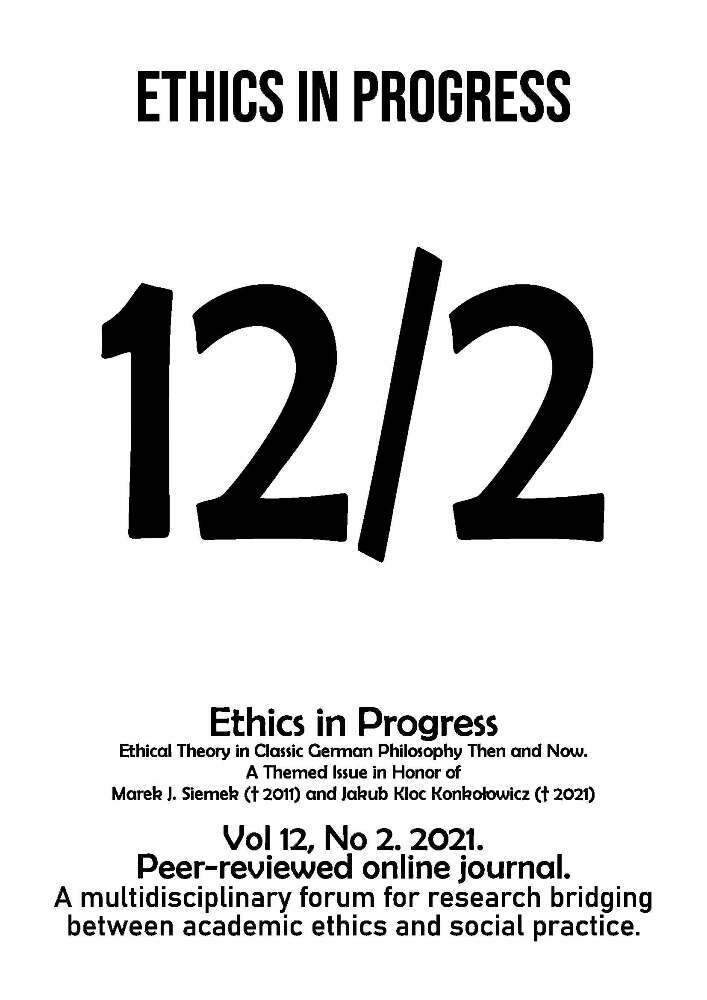Abstract
The article discusses a central topic of contemporary understandings of society that seems to have no place in Hegel’s theory: the topic of “identity”, which seems to fall between the process of a “struggle for recognition” on the one hand, and, on the other, a consolidated recognition of subjects and their rights within the established social order. The article would like to propose a further reconstruction here. It discusses which considerations should be included so that the discourse on “identity” does not end in any substantialist or ethno-national, egocentric understandings, but, instead, could become possibly a part of Hegel’s theory. In today’s dynamics and unsettling changes, there are undeniable needs for “identity” (which are also easily addressed, even fuelled, by corresponding offers). These are, as one could learn from Hegel, surrogates of a still not or no longer successful sufficient recognition. In this, “identity” is to be understood as critical work on oneself as a product of becoming, on inheritances, achievements, challenges, divisions, discrepancies, guilt and failures.
References
Adolphi R. 2018. „Übersoziale Kriterien in der Theorie sozialer Geltungen. Zur pluralistischen Logik der hegelschen ‚System‘-Form des objektiven Geistes“, in: T. Oehl und A. Kok (Hg.), Objektiver und absoluter Geist nach Hegel (S. 157–190). Leiden – Boston: Brill.
Adolphi R. 2019. „Pokusy rozumu. Romantyzm w tradycjach europejskiej Nowoczesności – na przykładzie Niemiec i Polski“ [Die Versuchungen der Vernunft. Romantizismus in den Traditionen der europäischen Moderne – das Beispiel Deutschland und Polen], in: E. Nowak (Hg.), Recepcja i oddziaływanie Marka Siemka w Europie (S. 365–391). Warszawa: Wydawnictwa Uniwersytetu Warszawskiego.
Assmann A. 1999. Erinnerungsräume. Formen und Wandlungen des kulturellen Gedächtnisses. München: C.H. Beck.
Assmann J. 1992. Das kulturelle Gedächtnis. München: Beck.
Echterhoff G. und Saar M. 2002 (Hg.). Kontexte und Kulturen des Erinnerns. Maurice Halbwachs und das Paradigma des kollektiven Gedächtnisses. Konstanz: UVK Verlagsgesellschaft mbH.
Emrich H. M. und Smith G. 1996 (Hg.). Vom Nutzen des Vergessens. Berlin: Akademie-Verlag.
Esposito E. 2001. La memoria sociale. Mezzi per comunicare e modi di dimenticare. Roma – Bari: GLF editori Laterza.
François É. und Schulze H. 2001 (Hg.). Deutsche Erinnerungsorte. 3 Bände. München: Beck.
Goodman-Thau E. 2005 (Hg.). Das eigene Erinnern. Wien: Passagen-Verlag.
Haverkamp A. und Lachmann R. 1993 (Hg.). Memoria. Vergessen und Erinnern. München: Fink.
Hegel G. W. F. 1807. Phänomenologie des Geistes. Bamberg – Würzburg: Goebhardt.
Hegel G. W. F. 1819/20 [1983]. Philosophie des Rechts. Die Vorlesung von 1819/20 in einer Nachschrift. Hg. von D. Henrich. Frankfurt am Main: Suhrkamp.
Hegel G. W. F. 1821 [erschienen 1820]. Grundlinien der Philosophie des Rechts. Naturrecht und Staatswissenschaft im Grundrisse. Berlin: Nicolaische Buchhandlung. – Zitiert nach der Ausgabe: Hegel G. W. F. 1970. Werke. In 20 Bänden. Hg. von E.
Modenhauer und K. M. Michel. Bd. 7 [dort auch mit Mitschriften aus Hegels Vorlesungen über dieses Lehrbuch]. Frankfurt am Main: Suhrkamp.
Hegel G. W. F. 1830. Encyclopädie der philosophischen Wissenschaften im Grundrisse. Dritte Auflage. Heidelberg: Oßwald. – Zitiert nach der Ausgabe: Hegel G. W. F. 1970. Werke in 20 Bänden. Hg. von E. Modenhauer und K. M. Michel. Bd. 10 [Dritter Teil. Philosophie des Geistes]. Frankfurt am Main: Suhrkamp.
Kloc-Konkołowicz J. 2015. Anerkennung als Verpflichtung. Klassische Konzepte der Anerkennung und ihre Bedeutung für die aktuelle Debatte. Würzburg: Königshausen & Neumann.
Locke J. 1694. An Essay Concerning Humane Understanding. 2nd Edition. London: Awnsham and John Churchil[l].
Nora P. 1984-1992 (Hg.). Les lieux de mémoire. 3 Bände. Paris: Gallimard.
Ricœur P. 1983-1985. Temps et récit. 3 Bände. Paris: Éd. du Seuil.
Ricœur P. 1990. Soi-même comme un autre. Paris: Éd. du Seuil.
Ricœur P. 2000. La mémoire, l’histoire, l’oubli. Paris: Éd. du Seuil.
Sen A. 2006. Identity and Violence. The Illusion of Destiny. New York: Norton. [Dt. 2007. Die Identitätsfalle. Warum es keinen Krieg der Kulturen gibt. München: Beck.]
Weinrich H. 1997. Lethe. Kunst und Kritik des Vergessens. München: Beck.
Welzer H. 2001 (Hg.). Das soziale Gedächtnis. Hamburg: Hamburger Ed.





